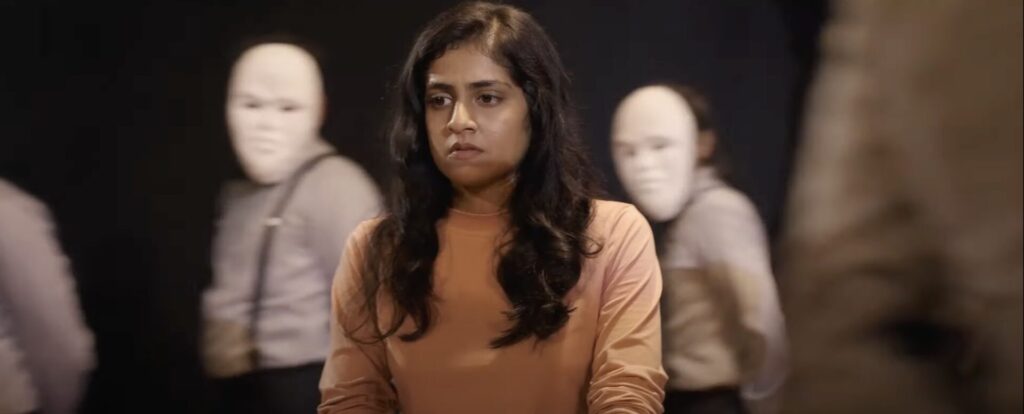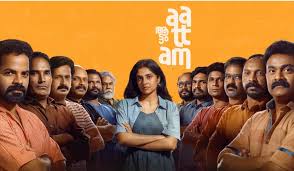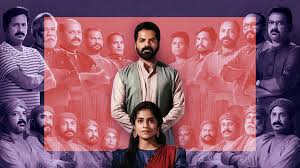Anand Ekarshi’s National award-winning Aattam exposes toxic masculinity and sexism driving sexual violence, critiquing a corrupt, male-dominated social order.
The recent announcement of the National Film Awards, with the Malayalam film Aattam directed by Anand Ekarshi winning Best Film, comes at a time when protests are sweeping across the country in response to the rape and murder of a young doctor in Kolkata. The lack of security for women and the media’s unempathetic sensationalism—some of them repeatedly dubbing the case as “Nirbhaya 2″—force us to reflect on the social conditioning that fosters such crimes. Aattam presents a powerful portrayal of the male psyche that drives such violence.
Aattam’s central theme is not inherently gendered. It illustrates that when injustice is inflicted on an individual, even those who empathize with the victim may hesitate to support them. The self-serving impulse to consider the potential perks/benefits of not opposing the offender often creates barriers to solidarity. People reflect on how avoiding confrontation with the offender might yield professional growth, personal favours, political mileage, or financial gains, leading them to remain silent.
In other words, the reluctance to forgo potential, albeit uncertain, benefits causes people to refrain from voicing their protest against the injustice done to a fellow individual. This social silence is at the heart of the film, and when the victim is a woman, this silence intensifies into a more profound act of violence.
The plotting plots
Framed as a courtroom drama, Aattam follows a group of 12 men and 1 woman who become embroiled in a crime when one of the men sexually assaults Anjali Balan (Zarin Shihab), the sole female artist of the troupe, while she sleeps. Anjali, an architect, is secretly involved with Vinay (Vinay Forrt), a married chef, who once was her lover. Hari (Kalabhavan Shajon), whom Anjali suspects as the offender, a film actor with higher status due to his celebrity connections, faces resentment from some group members. None of the artists are full-time professionals, relying on other jobs for income. After a late-night performance, the group is hosted at a resort where the assault occurs.

Vinay, nurturing resentment towards Hari, distorts Anjali’s account to ensure Hari’s expulsion, triggering a series of lies and deceptions. Anjali, convinced Hari is the perpetrator based on his car key and perfume scent, is misled by the fact that all the men used the same perfume that evening and Hari’s car keys were not with him that night. The investigation reveals that Hari was asleep during the assault, suggesting that any of the other men could be the assailant. As the investigation progresses, the true nature of each man in the group is also exposed.
Crime and punishment
The initial focus of the group was on determining how to punish Hari. Only one member raised the question of why the crime had occurred. Senior member Selvan, who posed this question, attempted to answer it by suggesting that the failure to instil in Hari—the accused—the values and depth of art, which cultivate a refined mind, was a collective responsibility of all the artists.
When some members, including Vinay, strongly advocated for Hari’s expulsion from the group as justice for Anjali, others hesitated, noting that they had only heard one side of the story from the victim. They argued that the accused should also be given a chance, especially in the absence of concrete evidence like an eyewitness or CCTV footage. Nevertheless, due to pressure to conform to the expectations of political correctness, they opted for Hari’s expulsion. However, Selvan’s insistence on having Anjali present during the decision-making process led to a shift in the unfolding events.

Vinay’s distorted statements now portray Anjali as a liar and someone attempting to defame a celebrity. However, this shift is not solely due to the lies. The team members, who had been facing financial difficulties, were presented with a lucrative opportunity to perform abroad, which promised to resolve their financial issues. Since Hari was the one who offered them this opportunity during the secret investigation into him, their perspectives began to change. As a result, the notion of justice in their decision is increasingly influenced by the economics of greed and self-interest. Consequently, Anjali is cast as the perpetrator.
The group manipulates her into declaring that she will neither seek legal action nor share her experience on social media, but will simply leave the group. When Anjali later discovers that her decision to leave was actually orchestrated by the male members, her realization shatters her. However, this betrayal ultimately empowers her to end her relationship with Vinay and move forward with renewed strength.
Tactile hallucination theory
Violence against women is often viewed through the perpetrator’s moral lens. An important aspect of the narrative is Madan’s theory of tactile hallucination, which posits that because Anjali was drunk, she might have hallucinated the assault. He argues that her mind is fabricating the incident and that no one actually groped her. Additionally, Selvan criticizes Anjali for her clothing and her supposedly loose moral standards due to her close interactions with men. These accusations are supported by other group members.

Although Vinay expresses his discontent with these views, both Anjali and the audience find reasons to doubt his credibility. Aattam reopens the debate on sexual violence, questioning whether it is a result of a woman’s behavior, moral conduct, or attire. As Anjali points out, while everyone debates whether her suspicions are accurate, no one considers the possibility of another perpetrator. Instead, they rely on the tactile hallucination theory.
Men and manipulations
In a patriarchal world, women are often viewed as potential targets for intrusion and are expected to tolerate such treatment. The narrative explores several instances where the possibility of forgiveness is considered. The group is primarily concerned about how Anjali’s decision to pursue legal action might tarnish the team’s image. The film highlights ultimate selfishness and chauvinism, despite the men appearing kind, naive, and politically correct. It suggests that, absent the pressure to maintain political correctness, the men would have likely sided against the victim from the start.
Manipulations begin early in the film but reach their peak when Vinay distorts the facts Anjali shared with him. When the group decides to protect Hari due to financial incentives, they all engage in this act of manipulation. For instance, Sudheer (another senior member) deliberately misinterprets Anjali’s language to sway those who are still grappling with the idea of Anjali as the victim.
As Anjali prepares to leave, Madan—who initially seemed the most just—consoles the team by asserting that even if she goes to the police, she lacks evidence, as Hari’s key, which led her to suspect him, was left behind and there were no CCTV cameras at the resort. The group even plans to discredit her using the hallucination theory.

Art as an alternative means of punishment and redemption
Selvan’s initial suggestion to assume collective responsibility for the heinous act, framing it as a failure of their art to purify the human mind, culminates in the manipulative use of art. Anjali, now leading her own drama troupe, channels her trauma into her work by scripting and staging the very experiences she endured, thereby using her art as a cathartic tool. On stage, as her character washes clothes and hangs them to dry, the symbolic power of the scene is striking. The chairs that once passed judgment on her and her suffering are now suspended and are hanging. This presents a powerful visual representation of how she has reclaimed her narrative through art.
By not keeping the truth to herself but presenting it openly, Anjali uses art as both a means of catharsis and a subtle form of retribution against her former co-actors. Her public “washing of dirty linen” is done with dignity, facilitated by the medium of art. When she declares that the masked perpetrator’s identity is irrelevant because, for her, all the eleven men are now the same, she underscores the pervasive nature of her trauma and the collective guilt that each of the perpetrators should endure.
Aattam offers a critical examination of the male psyche, which often marginalizes women and presumes the authority to judge their actions and morality. The film explores how a group responds to a crime, revealing that the traumatized individual is often the least prioritized, as Anand Ekarshi noted in an interview, much similar to the plot of Vijay Tendulkar’s Marathi play Shantata! Court Chalu Aahe (Silence! The Court Is in Session). While addressing the issues of sexual violence against women, Aattam highlights how men’s laws tend to be convenient and self-serving, with women’s resilience lacking any substantial support other than from themselves. The film conveys a powerful societal message, employing dramatic techniques of realism and alienation to engage the audience.





4 Comments
Great.Well written.
Congratulations!
Thank you indeed!
Truly well written article. Was not surprised to see the author as a English professor…
Thank you very much!